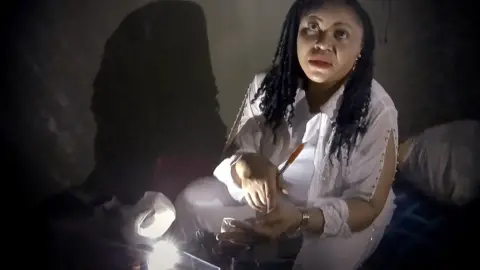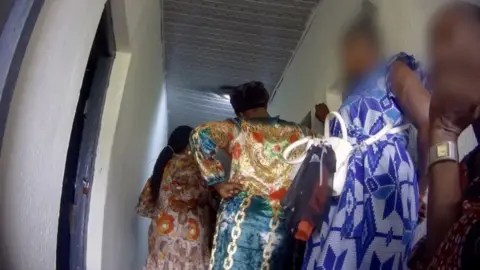Nigerian fertility scam: She is ‘pregnant’ for 15 months

 BBC
BBCChioma is adamant that Hope, the baby boy she is holding in her arms, is her son. After eight years of unsuccessful attempts to conceive, she sees him as her miracle child.
“I own my child,” he said defiantly.
She sits next to her husband, Ike, in the office of a Nigerian state official who spends the better part of an hour interrogating the couple.
As the commissioner for women affairs and social welfare in Anambra state, Ify Obinabo has a lot of experience in resolving family disputes – but not ordinary disagreements.
Five members of Ike’s family, who are also present in the room, do not believe that Hope is the couple’s child, as Chioma and Ike say.
Chioma says she “carried” the child for about 15 months. The commissioner and Ike’s family do not believe the nonsense of the claim.
Chioma says she faced pressure from Ike’s family to get pregnant. They even asked him to marry another woman.
In her desperation, she visits a “clinic” that offers unusual “treatments” – an unknown and disturbing scam that preys on women who want to become mothers and involves child trafficking.
The BBC was allowed by the authorities to access the commissioner’s interview with Chioma as part of our investigation into the secret pregnancy scam.
We have changed the names of Chioma, Ike and others in this article to protect them from retaliation in their communities.

Nigeria has one of the highest birth rates in the world, and women often face social pressure to get pregnant and even discrimination or harassment if they can’t.
Under this pressure, some women go to extremes to fulfill their dream of becoming a mother.
For over a year, BBC Africa Eye has been investigating the “secret pregnancy” scam.
Scammers posing as doctors or nurses convince women that they have a “miracle fertility treatment” that is guaranteed to make them pregnant. The first “treatment” usually costs hundreds of dollars and includes an injection, a drink, or an implant.
None of the women or officials we spoke to during the investigation knew exactly what was in these medicines. But some women have told us that it led to changes in their bodies – such as bloating – that led them to believe they were pregnant.
Women who have been given “treatment” are warned not to visit any doctors or regular hospitals, as there is no scan or pregnancy test that will detect the “baby”, which the fraudsters say is growing outside the womb.
When it’s time to “give birth” to a child, women are told that labor will only begin if they are prescribed a “rare and expensive medicine”, which requires an additional payment.
Accounts of how the “delivery” took place vary, but all are disturbing. Some are put to sleep only to wake up with a caesarean-like birthmark. Some say they are injected with an injection that induces drowsiness, a state of disorientation they believe they are giving birth to.
Either way, women end up having children to bear.
Chioma tells commissioner Obinabo that when it was time for her to “give birth”, the so-called doctor gave her an injection in her waist and told her to push. He doesn’t explain how he ended up with Hope, but says the birth was “painful”.

Our team is able to enter one of these secret “clinics” – contact a woman known as “Dr Ruth” to her clients – posing as a couple who have been trying to conceive for eight years.
The so-called “Dr. Ruth” runs his clinic every second Saturday of the month in a dilapidated hotel in Ihiala town, south-east of Anambra state. Outside his room, dozens of women are waiting for him in the corridors of the hotel, some with bellies sticking out.
The whole universe is filled with joy. At one point, a huge celebration breaks out inside the room after a woman is told she is pregnant.
When it’s our undercover reporters’ turn to see him, “Dr. Ruth” tells himself that the treatment is guaranteed to work.
He gives the woman an injection, saying it will enable the couple to “choose” the gender of their future child – a medically impossible feat.
After refusing the injection, “Dr. Ruth” gives them a bag of crushed pills and other pills to take at home, along with instructions on when to have sex.
This first treatment costs 350,000 naira ($205; £165).
Our undercover reporter does not take drugs and does not follow any of “Dr. Ruth’s” instructions and returns to see him four weeks later.
After using a device like an ultrasound scanner on our reporter’s abdomen, a heartbeat-like sound is heard and “Dr. Ruth” congratulates her on her pregnancy.
They are both happy with happiness.
After delivering the good news, “Dr Ruth” explains how they will need to pay for the “rare” and expensive medicine needed to deliver the baby, which costs between 1.5 and 2 million naira ($1,180; £945).
Without this medicine, the pregnancy can last for nine months, says “Dr. Ruth” ignoring the scientific truth, adding: “The child will be malnourished – we will have to rebuild.”
“Dr. Ruth” has not yet responded to the allegations that the BBC has made against him.

The extent to which the women involved believe the truth is that the claims are unclear.
But clues as to why they may be vulnerable to such lies can, in part, be found in online groups where misinformation about pregnancy is widespread.
A network of disinformation
Cryptic pregnancy is a well-known medical phenomenon, where a woman does not know about her pregnancy until the last stages.
But during our investigation, the BBC discovered misinformation spread on Facebook groups and pages about this type of pregnancy.
One US woman, who dedicates her entire page to “secret pregnancy”, says she has been pregnant for “years” and that her journey cannot be explained by science.
In closed Facebook groups, many posts use religious terminology to tout bogus “treatments” as “miracles” for those unable to conceive.
All of this misinformation helps reinforce women’s belief in this scam.
Members of these groups are not only from Nigeria, but also from South Africa, the Caribbean, and the US.
Scammers sometimes host, and send, these groups, allowing them to reach women who express an interest in “treatment”.
If someone has expressed that they are ready to start the scam process, they are invited to safer WhatsApp groups. There, managers share information about “secret clinics” and what the process involves.
‘I’m still confused’
Authorities tell us that in order to complete the “treatment”, the scammers need newborn babies and to do that they are looking for desperate and vulnerable women, many of them young and pregnant, in a country where abortion is illegal.
In February 2024, the Anambra state health department raided the center where Chioma had “taken” Themba.
The BBC has obtained a photo of the attack, which shows a large complex made up of two buildings.
In one there were rooms with medical equipment – apparently for consumers – and in another there were several pregnant women who were being held against their will. Some were 17 years old.
Some told us that they were tricked into going there, not knowing that their children would be sold to the scammer’s clients.
Others like Uju, whose name is not real, feel afraid to tell their family that they are pregnant and are looking for a way out. He said he was given 800,000 naira ($470; £380) for the child.
Asked if he regrets his decision to sell his child, he said: “I’m still confused.”
Commissioner Obinabo, who was part of efforts in his state to combat this scam, says fraudsters exploit vulnerable women like Uju to get children.

At the end of the intense interrogation, commissioner Obinabo threatens to take the child Hope from Chioma.
But Chioma admits his guilt, and the commissioner finally accepted his explanation that he was a victim and did not understand what was happening.
On this basis he allows Chioma and Ike to keep the child – unless the biological parents come forward to claim it.
But unless attitudes about women, infertility, reproductive rights and adoption change, scams like this one will continue to flourish, experts warn.
You can watch the documentary on iPlayer here and a YouTube version of this story here.
More news from Africa Eye:
Source link




